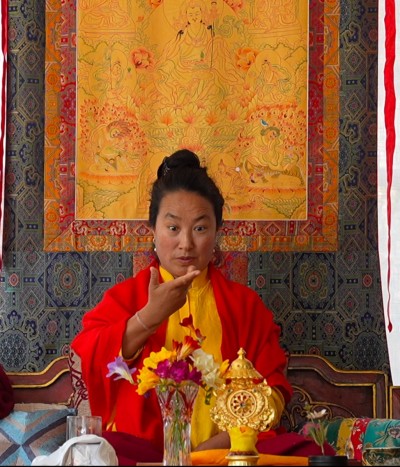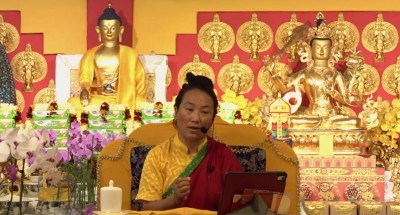Self-cherishing is the fundamental ignorance
Transcript of the teaching video:
When we talk about the nature of mind, it's something that we ordinarily have. It's just there. All sentient beings, in this life we have, to make use of the mind that we have, we often use a mistaken mind, in a mistaken way. What is this mistake that we have?
Just naturally, we all have a position, a point of view. Naturally, we have our own point of view. The clinging within that perspective that we each hold, through concretizing both outer phenomena and the mind within us, through concretizing those two things, we end up with self-cherishing - cherishing of the sense of self.
Because our perspective, our point of view, has a mistake in it, our conduct and behavior also become mistaken. We end up being primarily concerned with ourselves, our own situation, our own well-being, and we don't really think about all sentient beings. The courage to think in that way about all sentient beings doesn't happen, and that is a mistake. That kind of view that we normally have has a mistake in it. It's incorrect. Wouldn’t you say?
What does it mean to say something is incorrect? If we don't know how things fundamentally are, how they truly are, then there's a certain lack of knowledge, a certain ignorance in that. Within ignorance, there's an aspect of ignorance which doesn't know the natural peace and happiness that abides just within the mind. The normal phenomena of our sense experiences, the things we see, hear, taste, and touch, the raw sense experiences, we don't see what their true nature is. We don't see the true reality right in front of us.
Not just fundamental ignorance, but many different kinds of thoughts and concepts are generated by the mind, and we get very confused by that as well. Within our confusion, we take what is fundamentally transient and impermanent and fix it as something solid and lasting. Things that are fundamentally not clean and pure, we take them to be clean and pure. Something that has the actual nature of poisons, like the five poisons, we take it to be pleasurable and a source of happiness.
All these kinds of confusion come from taking what is not self to be self, what is not an identity to be an identity. From that, we get lust, aversion, delusion, jealousy, pride, ill will, animosity, and wrong views. We also lose the honesty of our mind. Through being attached to what we consider mine, my side and through aversion and animosity towards the other side, our enemies, and taking no interest in everything else, we generate a lot of suffering and continue to experience that suffering.
If we really examine that mind, we'll come to see that there's a kind of ignorance that just arises each moment together with experience, some kind of co-emergent confusion that keeps arising each moment with our experience. We'll also come to understand that kind of confusion is temporary, it's not inherent in the nature actually.
Because of the imprints from samsara's beginning, from that type of basic confusion, we have desire, anger, and delusion that just come naturally from that. When we talk about the nature of mind, the really subtle true nature of mind, by going subtler, subtler and subtler until we really find the authentic nature of the mind itself, that subtle inner nature is never contaminated by any of those things.
In that final ultimate nature, it's lucid, it's clear, there's no suffering at all in that nature. Nothing is unclear, nothing is problematic, there's no suffering whatsoever. Yes, we can say there's happiness and bliss there. From that perspective, even all the relative phenomena, all relative appearances can be seen and experienced in a way that is pure and also blissful.
Our teacher, the extraordinary enlightened Buddha Shakyamuni, the great teacher that we all have, taught the first turning of the wheel of Dharma. In the context of that teaching, he taught us to recognize suffering. He introduced what is suffering, taught us to recognize that and that it's something we can overcome. He didn't teach that suffering was permanent; he taught that it had a cause. Then we have the cause of suffering. It comes from causes and conditions, it's a dependent phenomenon : suffering. What was the cause that he taught? He taught the cause to be karma and afflictive emotions, that's where the suffering came from. He also taught that suffering can cease, the truth of cessation, and the truth of cessation is in the nature of our mind. It is actually referring to the nature of our mind. He taught that as a way to introduce the peace and happiness that fundamentally exists within the nature of our mind, in an ultimate way. He introduced that by talking about how suffering can end.
What we need to attain, what we can attain, is the peace and happiness that naturally abides in our own nature. In order to arrive at that place of recognizing our own nature, to experience the peace and happiness that naturally abides there, he taught how to get there. He taught the truth of the path. He emphasized that the causes of suffering should be reduced, the causes of happiness should be increased. How that works, when we do that, what the result of reducing our own suffering is, what the result of increasing the causes of happiness is, leads to a sense of disenchantment with the confusion of samsara, a sense of renunciation. That isn't just about giving up on something; it also involves understanding that liberation and enlightenment are possible. The yearning for that, the wish for being liberated, to awaken, the wish for awakening is born at that time.



